Bucharest 2017: ‘Thieves, thieves’
Vlad Dragomirescu tears the tickets himself. It is crowded in the foyer of his own theatre, located on a dark street near the centre of Bucharest. He is standing next to the main entrance and greets all visitors individually. Improvisational theatre is on the programme today. Dragomirescu, born in 1989, studied film directing and sound design. On 1 February 2017, he closed his theatre for two-and-a-half weeks, without hesitation. Even though the theatre is called Recul, culture as medicine, he had more important things on his mind. He left a message on Facebook: ‘We are arranging something in the Piata Victoriei (Victory Square). We will see each other again when the decree is thrown out.’
The previous night, 31 January 2017, the newly established Romanian government under the leadership of Prime Minister Sorin Grindeanu had issued Decree 13/2017. From then on, corruption offences with a value of less than 44,000 Euros would no longer be prosecuted. In addition, prisoners convicted of corruption would be released. Officially, the measure was intended to ease the pressure on prisons, but in reality, the new rules would be very convenient for many politicians, especially for the leader of the government party PSD Liviu Dragnea who was also accused of corruption. Romania is one of the most corrupt countries in Europe according to the index of Transparency International, for example.
“The measure was announced late in the evening.” Dragomirescu laughs scornfully: “Maybe they hoped we wouldn’t notice.” He was sitting in front of the TV, watching the news, a glass of wine in hand. His wife and son had already gone to bed. Dragomirescu is a quiet man, but when it comes to politics, there is a fire in his eyes, and he has the tendency to repeat the last words of his sentences: “I called a friend and told him: they did it anyway. ‘No, noooo,’ my friend cried out. We had already participated in small demonstrations, a kind of ‘pre-emptive-strike protest’, with which we wanted to let the government know: ‘Don’t you dare!’ And now they went ahead and did it anyway, now they did it anyway!”
Dragomirescu immediately jumped into his car, despite the glasses of wine, and without waking up his wife. His destination: the Piata Victoriei. The obvious place to go, because in the adjacent government building the responsible heads of government were still present. Dragomirescu arrived around midnight. Several hundred people had already gathered in the immense sea of asphalt that is the Victory Square, surrounded by broad four-lane boulevards where the traffic rushes by day and night. It was freezing, the trees in front of the government building were covered with snow, but the people were coming. And they kept coming. Dragomirescu: “Within an hour we were with tens of thousands.” ‘Thieves, thieves’ the protesters shouted at the politicians who were hiding behind the stern façade of the government building. They stayed there for two-and-a-half weeks, the largest protest since the revolution against dictator Nicolai Ceaușescu in 1989.

Timișoara 1989: a small incident
600 kilometres west of Bucharest in the city of Timișoara, Constantin Jinga also stood in a square in the freezing cold. Jinga (1969) is a priest in the church where Vlad Dragomirescu used to come, and they know each other well. “He is a good priest.” Dragomirescu keeps his description short and concise. Among the thousands of fellow demonstrators in Timișoara, Jinga felt hopeful for the first time in a long time. “It smelled like the spring of 1990. I thought: this could finally mean the completion of the revolution.” He is not the only one who refers to the past: ‘1989’ returned in slogans on protest signs and hashtags on Twitter. Jinga: “I was very touched when I heard a woman of about thirty say: ‘I am here because my father was killed in December 1989. Now I want to finish what he started.’”
In contrast to countries such as Czechoslovakia, Germany and Poland, the revolution against the communist regime in Romania was far from peaceful. It was estimated that there were more than a thousand deaths. Constantin Jinga could have been one of them. He was shot from close range on the first day of the uprising against the dictator. “That day is still the happiest day of my life,” he says, without a trace of irony in his voice. Sitting in front of an imposing bookcase in his home, he tells us about that formative time, via Skype. Once he starts talking, he seems to be catapulted back in time and remembers every detail. His tone remains light, even when he tells about the most terrible things, or perhaps especially then.
In late 1989, when Constantin Jinga was 20 years old, he had finished his military service and started to study French and Romanian at the University of Timișoara. Ceaușescu, together with his wife Elena, still calmly conducted his reign of terror and there was a lack of everything. The news about the revolutions in the rest of Europe only sparsely filtered through to Romania. Jinga: “I remember exactly how I walked down the street with a friend and how he told me that they were breaking down the Berlin Wall. I thought he was kidding.” Jinga and his school friends were desperate for change. “We tried to get hold of an illegal typewriter to distribute flyers and we made plans to swim across the Danube.” He chuckles at his youthful hubris: “We were serious about our swim training; the Danube is a dangerous river, you know."
On Saturday, 16 December 1989, the revolution also began in Romania, although, early in the morning, nobody in the country – including Ceaușescu – was expecting it. The uprising started, perhaps like all revolts, with a seemingly minor incident. In Jinga’s hometown of Timișoara, in the Western part of Romania, the popular pastor László Tökes was forced to leave the city because of his critical statements. He called on his parishioners to attend the 'move'. And so, an illegal gathering ensued in front of his house.
“In the middle of Saturday night, a friend called me. She was frantic,” Jinga explains: “She lived near pastor Tökes and was screaming that people were fighting with the Red Police. The people were calling for freedom. The news was unbelievable. I was so happy at that moment. I asked her if I should come, but she told me the police had dispersed the crowd. I went to bed, but at five o'clock in the morning I couldn’t bear it any longer.”
Jinga was expected at the university at seven o'clock for volunteer service in the canteen. “My mother urged me to be home at seven o'clock in the evening. I went outside, it was still dark, and saw that Timișoara had become a besieged city. There were soldiers everywhere.”
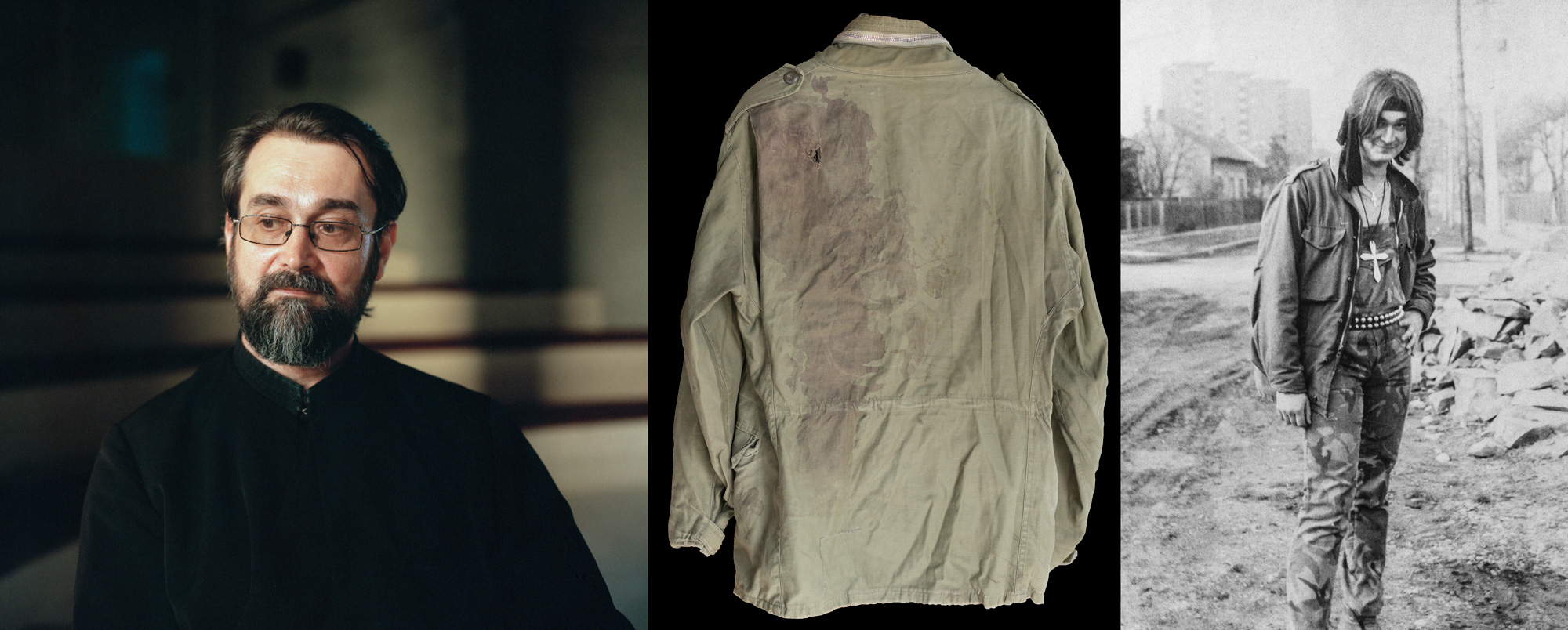
Bucharest 2017: the voice of the street
“When you demonstrate with a hundred people, you show them you mean business. When you are with tens of thousands of people, it becomes a party.” It is three months after the issuing of the decree in early 2017. A meagre sun is drowning Bucharest in white light. Vlad Dragomirescu is sitting huddled in a thick winter coat on the terrace of a hip café around the corner of the university. He is drinking home-made lemonade with a complicated name through a straw. The morning after the first demonstration, he immediately checked the news. “It gave me confidence, because intellectuals, artists, writers, philosophers, university teachers, the whole justice system – except the Minister of Justice, of course –judges, prosecutors ... "Dragomirescu takes a deep breath and continues: " the anti-terrorism department, the anti-fraud department, absolutely everyone criticised the new law, absolutely everyone. I immediately went back to the Piata Victoriei. It made no sense to go to work, because the actors, the audience and my colleagues were in the square too. It was spectacular: it was freezing cold, but people were playing the drums, and everyone was very inventive with slogans and protest signs. The Romanians have an interesting sense of humour when things go wrong. The square became a kind of Greek agora. You would go there and meet people with whom you discussed all sorts of things.”
In early February 2017, more than three hundred thousand people were demonstrating in Romania every day. Fake news flourished, as it does with every uprising, and even took on bizarre proportions. Romania TV, for example, led by business people suspected of corruption, was spreading the news that protesters were being paid by multinationals for their presence. Adults would supposedly receive 100 lei, children 50 and dogs 30. In response, the protesters brought as many four-legged friends with them as possible. Dragomirescu calls out: “As if Danone would pay us! Danone, those bloodsucking vampiric yoghurt makers!”
On 4 February, Prime Minister Grindeanu announced on television that he had heard ‘the voice of the street’ after all and that he did not want ‘a divided Romanian society’. Parliament would discuss a new corruption law and the Minister of Justice Florin Iordache was going to have to ‘take responsibility’. He did not resign immediately but did step down a few days later.
The government's response was too vague and unconvincing, the Romanian people decided. The next day, the demonstrations were even more massive. More than six hundred thousand people took to the streets. Loudly they demanded the resignation of the government and new elections.
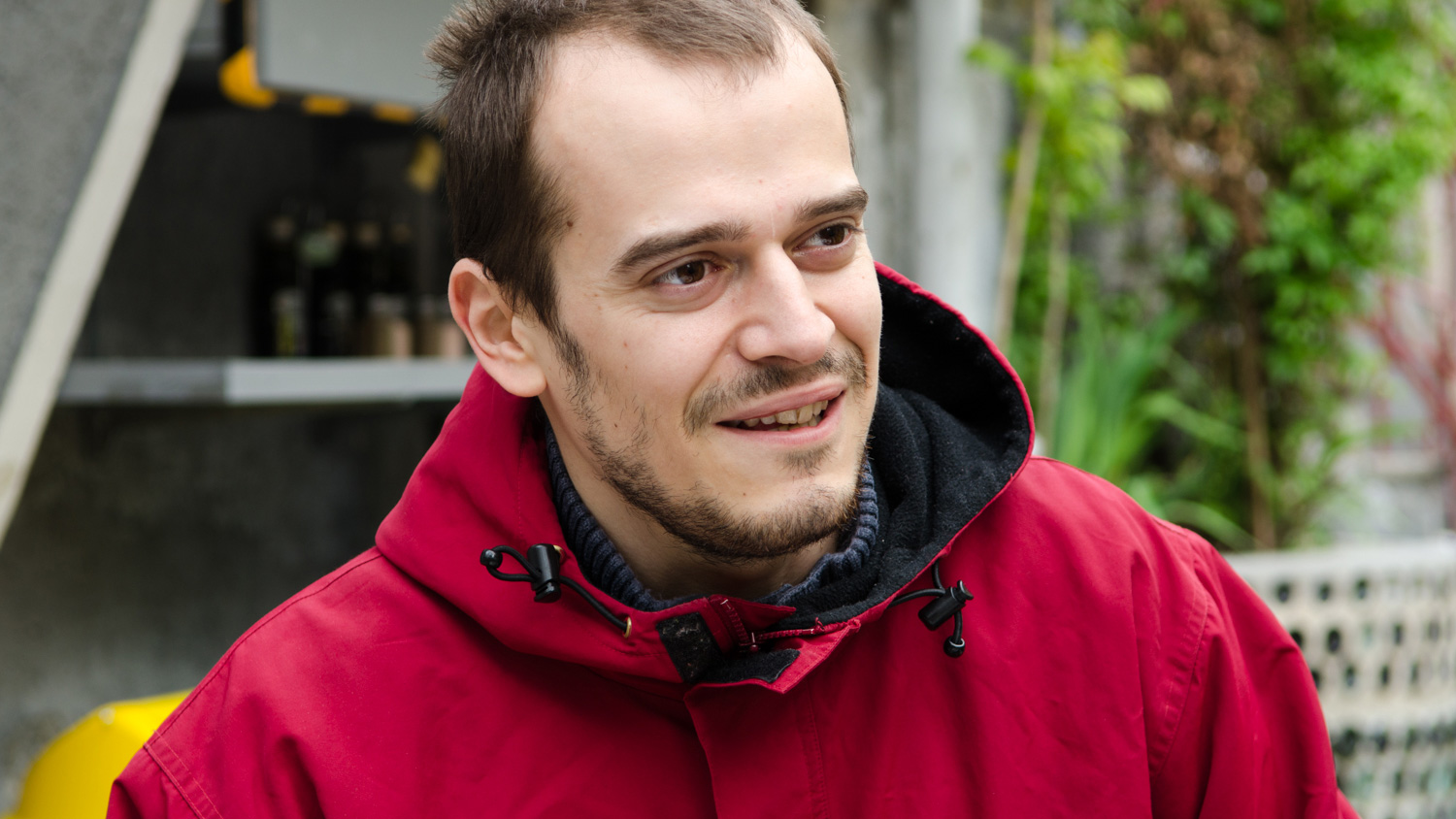
Bucharest 2017: the voice of the street
“When you demonstrate with a hundred people, you show them you mean business. When you are with tens of thousands of people, it becomes a party.” It is three months after the issuing of the decree in early 2017. A meagre sun is drowning Bucharest in white light. Vlad Dragomirescu is sitting huddled in a thick winter coat on the terrace of a hip café around the corner of the university. He is drinking home-made lemonade with a complicated name through a straw. The morning after the first demonstration, he immediately checked the news. “It gave me confidence, because intellectuals, artists, writers, philosophers, university teachers, the whole justice system – except the Minister of Justice, of course –judges, prosecutors ... "Dragomirescu takes a deep breath and continues: " the anti-terrorism department, the anti-fraud department, absolutely everyone criticised the new law, absolutely everyone. I immediately went back to the Piata Victoriei. It made no sense to go to work, because the actors, the audience and my colleagues were in the square too. It was spectacular: it was freezing cold, but people were playing the drums, and everyone was very inventive with slogans and protest signs. The Romanians have an interesting sense of humour when things go wrong. The square became a kind of Greek agora. You would go there and meet people with whom you discussed all sorts of things.”
In early February 2017, more than three hundred thousand people were demonstrating in Romania every day. Fake news flourished, as it does with every uprising, and even took on bizarre proportions. Romania TV, for example, led by business people suspected of corruption, was spreading the news that protesters were being paid by multinationals for their presence. Adults would supposedly receive 100 lei, children 50 and dogs 30. In response, the protesters brought as many four-legged friends with them as possible. Dragomirescu calls out: “As if Danone would pay us! Danone, those bloodsucking vampiric yoghurt makers!”
On 4 February, Prime Minister Grindeanu announced on television that he had heard ‘the voice of the street’ after all and that he did not want ‘a divided Romanian society’. Parliament would discuss a new corruption law and the Minister of Justice Florin Iordache was going to have to ‘take responsibility’. He did not resign immediately but did step down a few days later.
The government's response was too vague and unconvincing, the Romanian people decided. The next day, the demonstrations were even more massive. More than six hundred thousand people took to the streets. Loudly they demanded the resignation of the government and new elections.
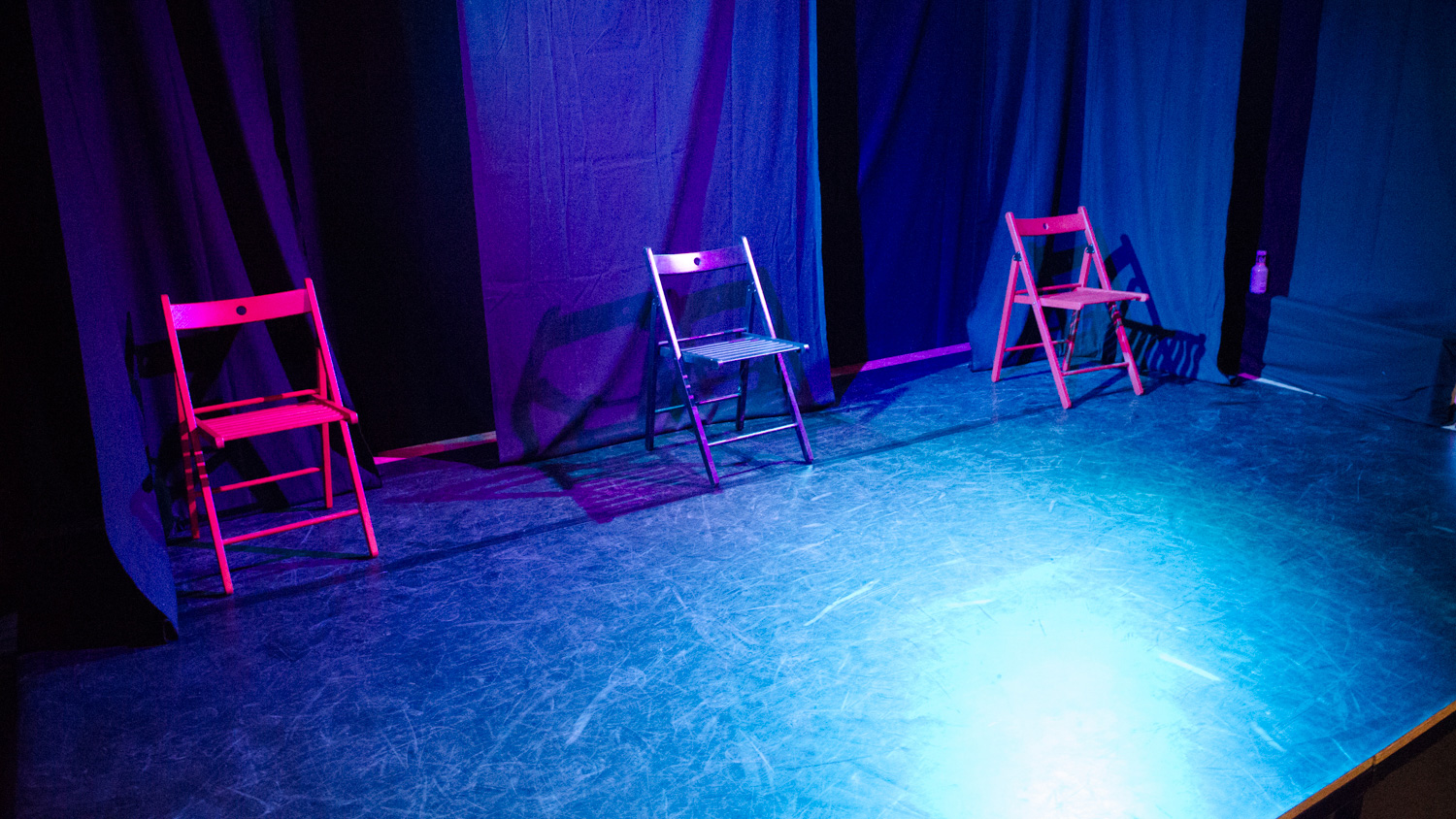
Bucharest 2017: The wrong side
Twentysomethings are sitting hip to hip on wooden benches in the small auditorium of Recul. They move a little closer together to make room for a latecomer. Vlad Dragomirescu is in the back, behind the mixer panel. He does almost everything himself, including light and sound. There is no curtain; a French and an Italian actor enter the simple stage from the foyer. In a mishmash of languages, they improvise with the words the public shouts at them. There is loud laughter.
Dragomirescu thinks that humour can help. Not long ago, he directed his own play here: ‘Fiare’, or in other words ‘The Beast’. “It is about the unfortunate connection between the art world, the theatre and politics. There are a lot of respected actors who choose the wrong side. It’s a comedy about things that aren’t really funny. But maybe if you laugh about it, who knows…”
It is not hard to determine what ‘the wrong side’ is, according to Dragomirescu: “To put it bluntly, the wrong side is that of the PSD, the government party. They still have former members of the Communist Party. It’s Iliescu’s party! Iliescu!” Ion Iliescu replaced Ceauşescu immediately after the revolution. He is accused of having recruited miners in June 1990 to beat up protesters against his government. Hundreds of people lost their lives. In spite of that, he became president of the country again in the 1990s and 2000. Dragomirescu: “That is now twenty-seven years ago and …” A meaningful silence ensues. “I’m not saying another party is better, because, frankly, there is no good party right now. It’s just a tragedy. A tragedy.”
Older revolutionaries like to complain about the Romanian youth, who, supposedly, are not interested in history. This is not the case with Dragomirescu. Born in 1989, just one day before the fall of the Berlin Wall, and the child of a father who participated in the revolution, he tells the stories of that time as if he had been there himself. He grew up in the town of Resita in the shadow of a huge steel mill, which came into Russian hands after the fall of communism – which Dragomirescu views as quite ironic. “My father was a devout orthodox Christian, but religion was banned during communism. He used to listen to Radio Free Europe every day. After the revolution, he became politically active. He was naive then, very idealistic, thought he could actually change something. If he couldn’t do it, then who could?”
Dragomirescu sees a connection between the massive demonstrations of 2017 and the revolution against Ceauşescu. “In 1989, the people wanted not just food on the table but freedom. Although that is a somewhat romanticised way of thinking about it because we didn’t really know the concept of freedom. People took to the streets because they wanted a country that was like other countries. They looked across the border and saw that even the Serbs in Yugoslavia had a better life. People wanted politicians who would think about the wellbeing of the people, politicians who would tell the truth - although, of course, the truth is a tricky concept, but it would be nice if they would at least spread information. Liviu Dragnae, the real leader of the PSD, has been convicted of electoral fraud! The acts of violence during and after the revolution have never been properly investigated; so much is still unclear. No, in a sense, the 1989 revolution is far from complete.”
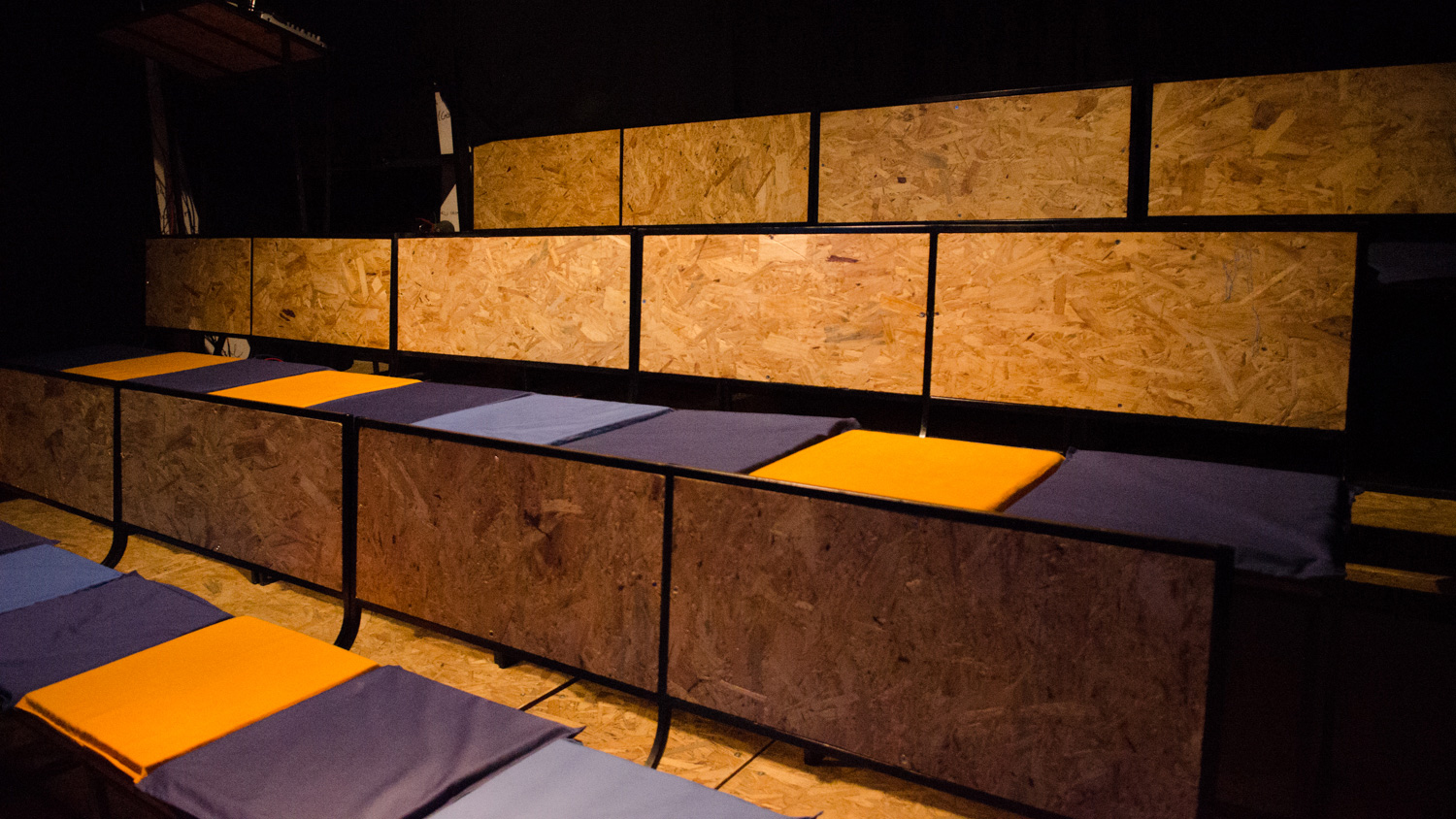
Timișoara 1989: Young men
“I saw flashes in the air. I just hoped it was a flare to illuminate the crowd, but I wasn’t sure.”
Constantin Jinga, just out of the service, knew the military protocol for the use of force by heart: First say ‘stop’, then 'stop or I’ll shoot', and if a person still continues, shoot in the air and only in the last instance aim your gun at the person. “At the legs, because you don’t want to kill.” Jinga could not imagine the soldiers would actually start shooting at people: “The soldiers were young men like me.”
Hundreds of people came running his way. He and his friend were carried by the stream of people, crossing the bridge in the direction of the cathedral. Again shots were fired. The sound lasted for minutes. Jinga no longer smiles when he talks: “It felt as if a war had broken out. I began to realise that it was not going to be easy.”
Had he been afraid? The questions bring back a smile to his face. “Not at all. I started to get really into the mood now to do … to do whatever.”
Bucharest 2017: #Insist
At nine o’clock exactly, the national anthem can be heard in the sea of asphalt that is the Piata Victoriei. In the setting June sun, about forty men are standing in a circle in front of the government building. Their singing is drowned out by the roar of passing cars. The large-scale protests disintegrated from mid-February. A small group of protesters, however, perseveres. They stand there every day, for 134 consecutive days straight now, and they will last until the end of the year. They have set up a small encampment of a few plastic chairs, a parasol and a cool box right in front of the government building. They have put up two banners along the road: the first one says #rezist, the second one #insist. After the national anthem, the demonstrators turn to the government building and chant: 'Step down! Step down!’ The building does not falter. The cars that are whizzing past honk at the protestors. Sometimes someone takes the trouble to roll down the car window and shout: "Find a job, you losers!"
Vlad Dragomirescu tries to join the demonstrators as often as possible: “Our request was straightforward: the decree has to go, and after that, so do you. The government is still there. That’s why I still go there every Sunday. With about twenty others,” he adds ironically, but without cynicism. “Something has really changed in Romania. A movement was created. People have put fear aside. A fear that would be understandable, because people remember the violence of the past. Who was shooting at whom in ’89? No-one knows.” Constantin Jinga also thinks that something has changed: “People have become more aware of their power. They have rediscovered solidarity. Now they have to learn how to use it," the priest adds.
Dragomirescu is trying to stay positive: “I have to, I do not want to move to a different country. I want to stay in the place where I feel at home, but I don’t want to raise my children between all the garbage. And by that, I don’t mean the waste on the ground, or maybe that too, but I am talking about a clean political situation. I do not want a leader who thinks that extortion is not that important.”
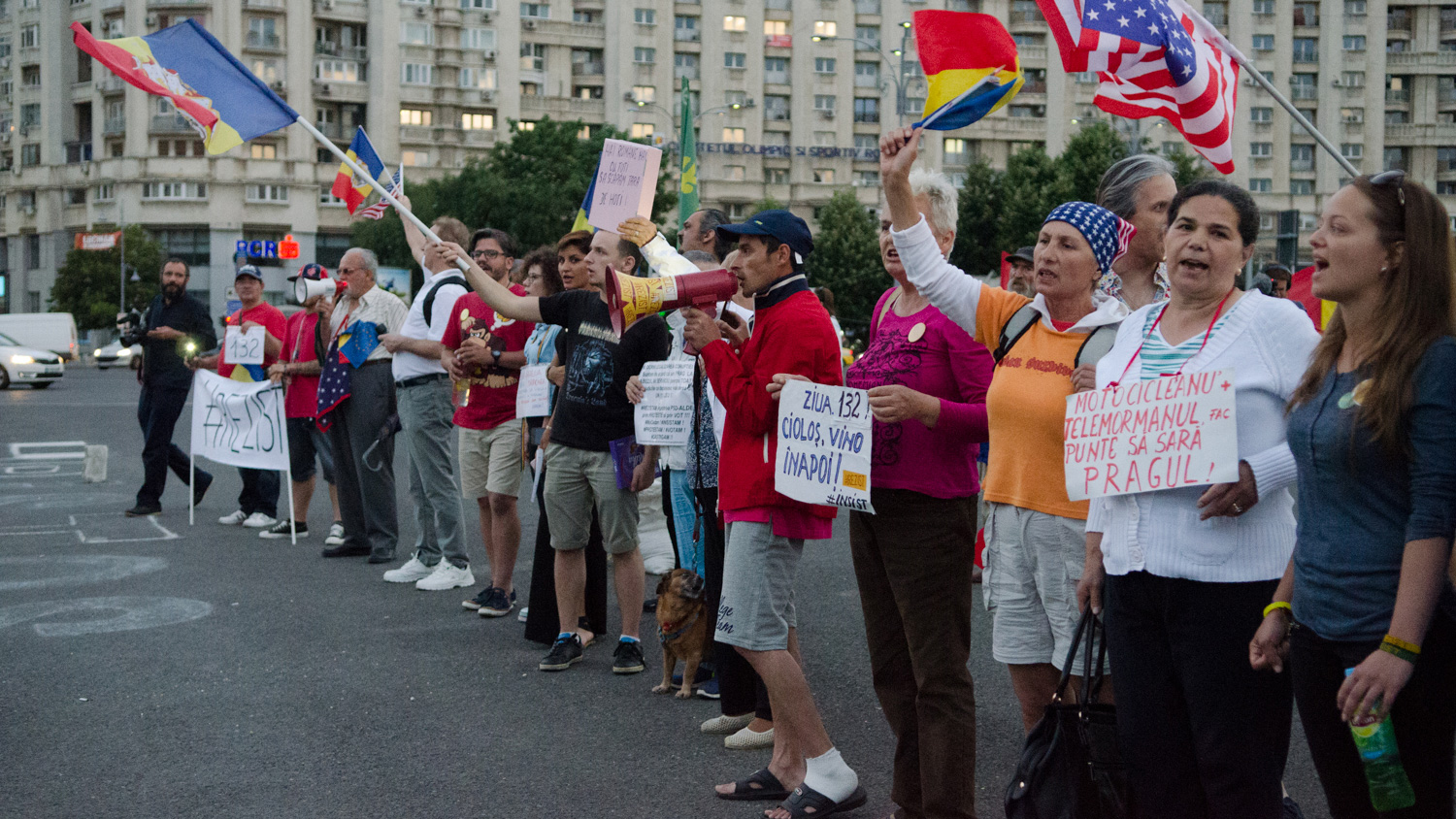
Timișoara 1989: The happiest day of his life
“We were stopped by soldiers. They were carrying machine guns and they were lined up in two rows, which was odd.” Constantin Jinga wanted to bring his friend back to the hospital so that she could be with her son again. Jinga himself was planning to go back to the campus, through side streets, to further organise the occupation of the radio station there. “Clearly, the situation was so serious that we had to inform the international media.”
“We were standing there with about a dozen people. Next to us was a mother with two children, and an old man. ‘Are you going to shoot us?’ the man asked. ‘You are Romanians, why would you shoot us? Is it because you love Ceaușescu? And an ice-cold shower and nothing to eat?’ The soldiers did not answer. The man continued: ‘These people could be your brothers and sisters. You want to shoot them?’ At that moment, Jinga saw from the corner of his eye that an officer was approaching. “He ordered the soldiers to retreat. At least, that’s what I thought. I remember counting their steps: one, two, three, four… and then they raised their guns. I told myself that this was to intimidate us. But…, then…, I saw that they were shooting. Just like that. The old man next to me fell.” Jinga clears his throat: “He was shot in the head. I turned around and saw that the woman was running, taking her children by the hand. Later I heard that the smallest one did not make. In a split second, I turned and tried to press my friend to the ground. At that moment, I was hit in the shoulder. I felt no pain, just a feeling of powerlessness. I saw blood and thought I was going to die. I had seen it in movies. Strangely enough, it also flashed through my mind that I would arrive late at my parents’. I started to pray, and everything became quiet. Looking back at it, it is a great feeling, very beautiful. Haha, I wouldn’t like to do it again though.” Jinga was brought to the hospital by four people. One of them was hit while helping Jinga. “To this day, I do not know what his name is.”
His shoulder would never quite be the same. From his hospital bed, Jinga watched how the rest of the revolution unfolded. On 21 December, Ceaușescu gave a speech from the balcony of the parliament building in Bucharest to a so-called ‘counter demonstration’ of thousands of people. His words were broadcasted live on television. Suddenly someone from the audience shouted ‘Timișoara! Timișoara!’ Others joined in. The TV footage shows Ceauşescu hesitating for a moment, his next sentence lingering in the air. He is silent and looks around, dismayed. Then the television broadcast is cut off. The uprising spread to the capital. On 22 December, Nicolai Ceaușescu and his wife Elena fled from Bucharest by helicopter in a blind panic. During a show trial, they were sentenced to death on Christmas Day and immediately dragged in front of the firing squad.
Epilogue: Bucharest 1 year later
Early in December 2017, almost a year after the large-scale demonstrations in February, Vlad Dragomirescu was protesting in front of the parliament building. ‘Burn the PSD’ he wrote on Facebook. Parliament wanted to adopt a law that strengthens the government's grip on the justice system and erodes the independence of the judiciary. Who was it that led the investigation in preparation for this proposed piece of legislation? It was Florin Iordache, the Minister of Justice who was also responsible for the corruption decree. The day after Christmas, the PSD announced that it wants to introduce a new law that would allow corruption offences of up to €200,000 to go unpunished.